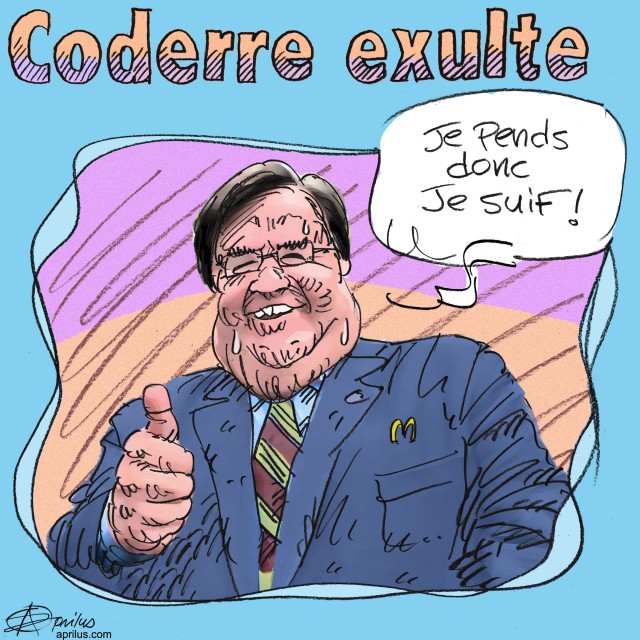Denis Coderre wanted the mayoralty of Montreal only as a consolation prize.
He was tired of being a member of Parliament, and Justin Trudeau was blocking his way to the job he really wanted, the federal Liberal leadership.
So Coderre settled for running for mayor of Quebec’s metropolis.
At a time when everybody in Quebec claims to yearn for a new style of politics, Coderre is a caricature of the old-fashioned pol: glad-handing, backslapping, winking and grinning — everything but the cigar and the homburg hat.
The city’s business establishment, and many in its media, roll their eyes at the thought of Coderre as mayor.
Business leaders found him so lacking in anything but personal ambition that they went looking for an ABC candidate (Anybody But Coderre), and settled on a 71-year-old technocrat unknown to the general public, Marcel Côté.
And Coderre welcomed into his “team” — as “party” is a bad word in this year’s Quebec municipal elections — several refugees from the discredited Union Montreal, whose last two mayors were forced to resign in disgrace.
But after six victories in seven federal elections, Coderre is the most politically experienced of the mayoral candidates, and the best-known.
Plus, he is a man of the people who livetweets updates of Canadiens games.
And apparently, glad-handing, backslapping, grinning, winking and livetweeting “c’est le BUUUT!” is what the people want.
To what should be the surprise of none, the first published poll results in the campaign have given Coderre what Christian Bourque of the Léger polling firm called a “relatively comfortable” lead four weeks from voting day.
In the poll for the Québecor media chain that Léger conducted last Thursday through Saturday, the results of which were published on Monday, 39 per cent of Montreal voters expressing a preference said they would vote for Coderre.
That gave him a 16-percentage-point lead over Richard Bergeron in second place.
The surprise in the results was the close race for third. The money candidate, Côté, until now considered a serious contender, was chosen by only 17 per cent.
And Mélanie Joly, a 34-year-old suspected of running only to (ugh) “grow her brand” for a future career, exceeded expectations at 16 per cent.
Coderre’s early lead may be soft, if it is based solely on name recognition.
In the 2009 Montreal elections, only 39 per cent of eligible electors cast valid votes.
In the poll, however, Coderre held an overwhelming lead in popularity among the older voters who are most likely to turn out at the polls.
And he appears to have potential to grow, since the proportion of all voters expressing a good opinion of him exceeded his support by 15 points.
So maybe the only thing that might stop Coderre is an alliance among his rivals.
Bergeron, the candidate of the left-wing Projet Montréal, appears to have little growth potential; his 23 per cent in the poll is just below the 25 per cent of the vote he received in 2009.
Still, a candidate running second is not likely to drop out in favour of an opponent with less support.
And if Joly is running for the future and continues to do better than expected, then it will remain in her interest to stay in until the end.
That leaves Côté, who is failing as the business community’s stop-Coderre candidate, as the one who appears most likely to drop out.
A Côté-Bergeron, right-left alliance would be against the laws of nature, however.
And Léger pollster Bourque told me on Monday that, based on the profile of Côté’s supporters, they were most likely to switch to Coderre.
So on Monday morning, the forecast for Montreal was cloudy with showers, windy, and four years of Denis Coderre as mayor.
Macpherson: Plan B: Anyone but Coderre

































Laissez un commentaire Votre adresse courriel ne sera pas publiée.
Veuillez vous connecter afin de laisser un commentaire.
Aucun commentaire trouvé